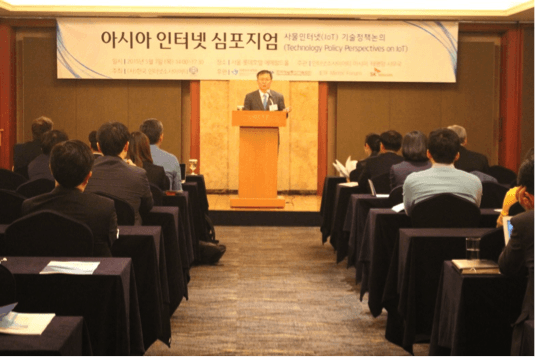The ubiquitous penetration of the Internet driven by rapid advancement of mobile network and software defined networking technology is enabling advanced services by interconnecting (physical and virtual) things. Today, various industries are redesigning their business models and processes along the Internet of Things (IoT) paradigm. To maximize the envisioned social and economic benefits of IoT, issues like interoperability, mashing up data, open platforms, security, privacy and standardization are to be addressed.
The Asia Internet Symposium at Seoul staged a multi-stakeholder debate on the technological and policy perspectives of IoT. The event was organized Internet Society (ISOC) Asia-Pacific Bureau together with ISOC Republic of Korea Chapter, and attended by experts from the ITU, the Ministry of Science, ICT and Future Planning, industry players, academia, and end-user community from South Korea.
The Director General of the Ministry shared the details of an IoT implementation plan under the Digital Planet Strategy 2020. For 2015, the Korean Government is going to provide 1 trillion won in funding to various IT-related industries, including 77.2 billion won ($70 million) for IoT research, development and implementation. The implementation plan touches upon three key areas:
–Creation and expansion of a creative IoT service market
–Fostering global IoT-specialising companies
–Establishing safe, IoT development infrastructure
An interesting five-layer problem space was presented by the Director of the ITU Telecommunication Standardization Bureau consisting of:
– Targeted Things
– IoT Identifiers
– Security, Trust and Privacy
– Implementation
– Globalization
The ITU Director emphasized a single solution to address these problem areas: active engagement and collaboration among all parties participating in the IoT ecosystem.
For the interest of readers, Republic of Korea ranked as second in IDC’s ‘Internet of Things Index’ in 2013, behind the United States. In 2014, the country established a ‘Global Council of Public and Private Sectors for IoT’, along with an ‘IoT Innovation Center’ to improve partnership between software and device manufacturers and businesses.
Speaking at the event, South Korea’s largest mobile operator, SK Telecom, shared their approach towards IoT services together with the launch of “ThingPlug”, an Internet of Things platform to boost the IoT ecosystem. The platform will form the basis of smart city development in the country, allowing developers to build an IoT service or application through a software development kit.
Experts at the event agreed that IoT will present a challenge for establishing an ‘Anyone, Anytime’ Security. While building trust helps to enhance safety and reduce complexity, quality of information is a requirement for many IoT-based systems.
In the converged world, demarcation between various industries and between standards-developing organizations is blurring. Understanding the distributed nature of the development process is essential for handling security problems, and necessitates a Collaborative Security Approach.
The event concluded that the success of an ‘Inclusion of Things’ era is only possible through enhanced privacy, building secure IoT devices, reducing the amount of data collected by IoT devices, increasing transparency, offering consumers with a choice to opt-out of data collection, and applying a collaborative approach on a global level.

